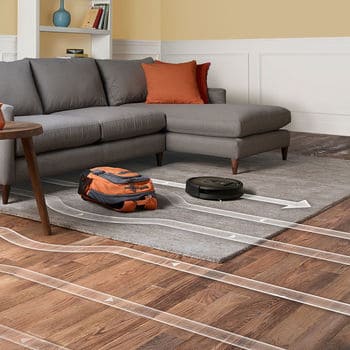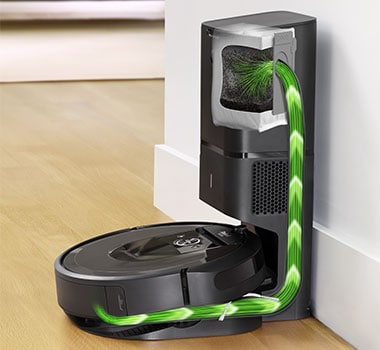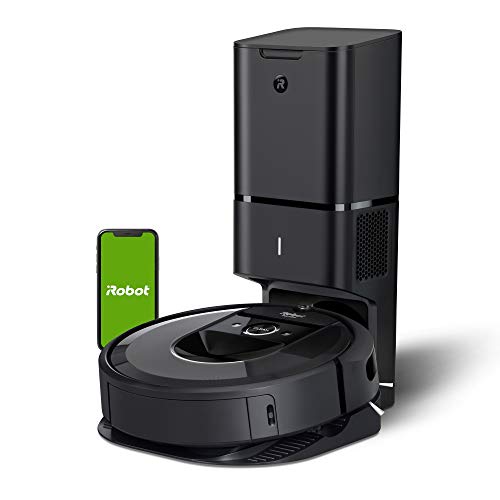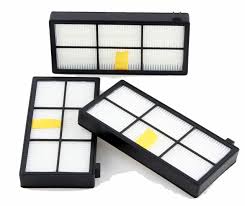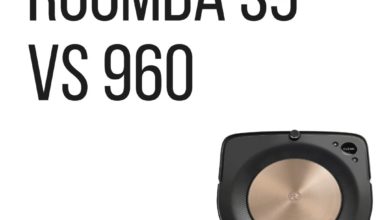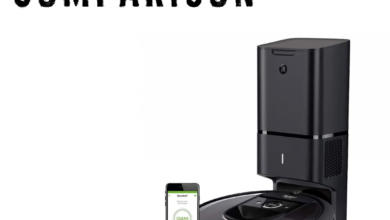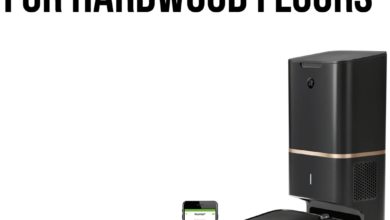Roomba i7 vs 980: Key Differences & Similarities
If you want a powerful robot vacuum that can handle carpets and navigate efficiently, you have come to the right page. The Roomba i7 and 980 are two top of line powerhouses from iRobot, that are solid at cleaning even tougher carpets. This article will take you through the key differences between the two as well as many of the similarities. Looking at everything from navigation technology to cleaning power and smart home-related features, after reading this you will understand all you need to know about the Roomba i7 and 980. However, if you want to know all there is about Roombas, please read this article.
Contents
Comparison Chart: Roomba i7 vs 980
| Model | ROOMBA i7+ | ROOMBA 980 |
|---|---|---|
| Design | 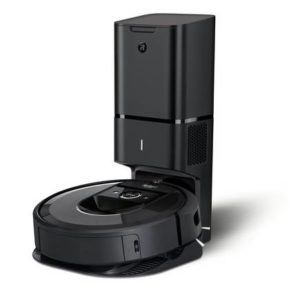 | 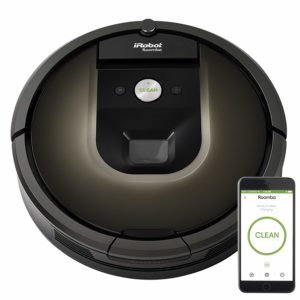 |
| iAdapt Version | iADAPT 3.0 | iADAPT 2.0 |
| Mapping Technology | IMPRINT | SMART |
| Cleaning Motor | GEN 3 (10x Stronger) | GEN 3 (10x Stronger) |
| Recharge/ Resume Cleaning | ✔ | ✔ |
| Automatic Dirt Disposal | ✔ | |
| Bottom Line | Recommended Pick for the best features and balanced price | Good on Carpets |
| Availability | Check Price | Check Price |
1.Design & Measurements
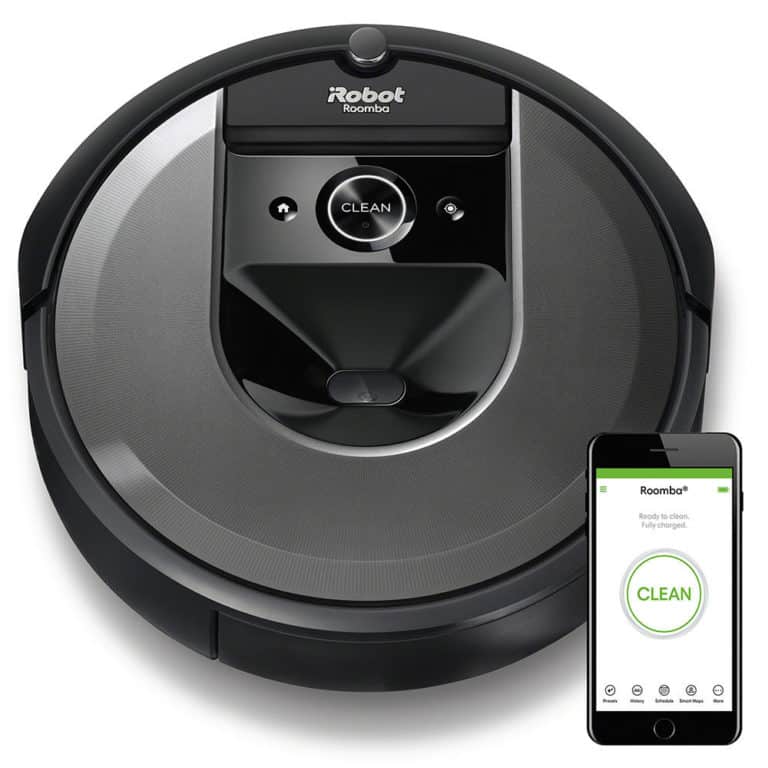

Both the Roomba i7 and 980 carry iRobot’s traditional circular shape. In our comparison of the Roomba i7 and Roomba 960, we covered the design which is relatively more similar. With the Roomba 980, you have a dark brown and black color scheme which is a little different to the normal grey and black schemes in Roombas. Dimensions and weight are also very similarly matched, any difference is very unlikely to make an impact on clean. A difference is the location and style of buttons on each robot vacuum, as you can clearly see in the images.
- The Roomba i7 is 3.7 inches high, 13.4 inches wide and weighs 7.5 lbs.
- The Roomba 980 is 3.6 inches high, 13.8 inches wide and weighs 8.7 lbs.
The navigation technology of a robot vacuum is one of the most critical features as it dictates how efficient the cleaning routes and how long it will take. Starting with the Roomba i7, iAdapt 3.0 is the most intelligent and advanced by iRobot. It has a more detailed smart mapping called Imprint Mapping, which is able to distinguish individual rooms which can be cleaned on a one by one basis. For the first time, users have been able to respond to the sudden mess made in one room which increases eases of use greatly. The only other robot vacuum with the highest iAdapt 3.0 is the top of the range Roomba S9.
The Roomba 980 is one of two Roombas that utilize iAdapt 2.0, the other being the Roomba 960. Although it isn’t the number one technology by iRobot, iAdapt is especially advanced as it still uses a camera and a Smart Mapping approach to generating maps and therefore efficient cleaning routes. This camera works in the same way that it does in the Roomba i7, it explores your home identifies the living area and obstacles. After this stage, intelligent AI can calculate the most effective routes to take. All of the maps from iAdapt 2.0 and 3.0 are available on the iRobot Home app and are called Clean Map Reports. Whilst iAdapt 3.0 has better mapping technology, the real difference between the two is the precision of the maps reports, ie the identification of rooms.
Another really useful feature that Roombas with iAdapt 2.0 and 3.0 can use is Self-Recharge and Self-Resume cleaning. This is made possible with the smart mapping and in practice what happens when the robot is low on battery it will return to the charging dock. Once recharge it can return to exactly where it left off and carry on cleaning until the job is done. Of course, this applies to both the Roomba 980 and i7, as well as the 960 and S9.
3. Cleaning Technology
iRobot’s Gen 3 Motor is used in both the Roomba i7 and 980, which means their suction power is very similar. The company has released a whole range of cleaning motors over time, with each progressing set of models getting more powerful. Being ten times more powerful than the 600 series original 3-Stage Cleaning Motor, the Gen 3 is second to only the Superior 3-Stage Cleaning Motor found in the Roomba S9, which is forty times stronger than the 600 series. These two models are evenly matched in this respect and will be more than capable on most carpets.
4. Upgrade to Self-Disposal
Self-Disposal technology is one of the greatest if not the greatest difference between the Roomba i7 and Roomba 980. Only two series of Roombas can access this feature if an additional Clean Base is purchased, which are the S and I series. You can read more about this difference in our comparison of the Roomba i7+ and Roomba i7. The Roomba 980 can’t do this and is highly unlikely to be ever to do this as it is a new technology requiring some hardware that it doesn’t currently have. Self-Disposal technology and the Clean Base can hold up to 30 loads worth of cleans by the Roomba i7. We all know that robot vacuums are there to take the job out of our hands, but this takes things to a new level as we can detach from cleaning for weeks at a time.
5.Dustbin Size
The Roomba i7 has marginally bigger dustbin, 0.7 L compared to the 0.6 L of the Roomba 980. Both of these will exceed the amount needed to clean your home. The real question about dustbin capacity is more related to if you want a Clean Base Station and the associated benefits of Self-Disposal technology.
6. Similarities
iRobot has many staple technologies that are found in all of the newest models. Here we will quickly glaze over what they are, including WiFi connectivity, the iRobot Home app and voice control and HEPA filters.
iRobot Home App
iRobot’s Home App has unleashed a whole new realm of control and possibilities with the Roomba range. Every model released now can work with WiFi connectivity and the iRobot Home app, and although it isn’t essential to use, it is more than recommended. There are a few technologies that the Roomba i7 can gain access too with the app that the Roomba 980 can’t. These are mostly associated with the precise Imprint Mapping:
- Identify individual rooms (Imprint Mapping)
- Individual room cleaning
- Store different floorplans for upstairs and downstairs
Here are the rest of features accessible for both the Roomba i7 and 980:
- Clean Map reports
- Statistics on cleaning - coverage, clean time and charge time
- Start and pause cleaning
- Schedule for different days of the week
- Customize cleaning preferences
- Monitor the live activity of your Roomba
- Receive live notifications
- Voice control with Alexa
- Automatic software updates
HEPA Filters
Both the Roomba i7 and 980 use HEPA filters which capture up to 99% of the finest dust, debris, and pollen down to 3 microns in size. This can help boots battery life and remove your home of allergens that may affect you negatively.
8. Overview of Main Differences
Here is a compounded lift of the main advantages that the Roomba i7 has over the 960:
- The Roomba i7 has more advanced navigation technology iAdapt 3.0 and Imprint Mapping, the most advanced form iRobot.
- The Roomba i7 can be upgraded to have Self Disposal by purchasing a Clean Base station.
- The Roomba i7 has a larger dustbin of 0.7L to the 0.6L dustbin of the 960.
- The design of each is slightly different.
9. Overview of Main Similarities
This list compounds some of the similarities between these two robot vacuums:
- Both the Roomba i7 and 980 have Smart Mapping technology.
- Both the Roomba i7 and 980 have the Gen 3 Motor.
- Both the Roomba i7 and 980 have 2 hours of battery life.
- Both the Roomba i7 and 980 have HEPA Filter
- Both the Roomba i7 and 980 can Self-Recharge and Resume cleaning.
- Both the Roomba i7 and 980 are WiFi connectable.
- Both the Roomba i7 and 980 work with the iRobot Home app.
- Both the Roomba i7 and 980 are controllable with voice assistants.
Final Word
A comparison of the Roomba i7 against the 980 is much more similarly matched than the Roomba 960. The only differences worth considering are the ability to upgrade to self-disposal with the Clean Base and the precise Imprint Mapping that can identify and clean rooms in isolation. Beyond that, the use of many features remain the same with the most notable being the iRobot Home app, the Gen 3 motor and the Self-Recharge and Resume cleaning. However, we feel that the Roomba 980 isn’t as good of a choice as the i7 or 960 due to its price and various technologies being somewhat in the middle.
FAQ
This section will answer a few of the most commonly asked questions about the Roomba i7, Roomba 980 and how they compare against each other.
What is the difference between the Roomba i7 and 980?
The major differences between these two models are that the Roomba i7 has Automatic Dirt Disposal as an option as well as iAdapt 3.0 which includes IMPRINT Mapping. In practice, this means that the Roomba i7 can self dispose of up to 30 cleans worth of dirt and can clean rooms individually.
Is the Roomba i7 or 980 better on carpets?
The Roomba i7 and 980 both have the GEN 3 Cleaning Motor from iRobot which is 10 times more powerful than the motor in the 600 series. On carpets, they will both perform to the same high standard as they have the same suction power.
Do the Roomba i7 and 980 map your home?
Yes, both of these models have smart mapping technology that uses a camera to create a virtual floor plan of your home. The Roomba i7 has IMPRINT Mapping and iAdapt 3.0, which s more advanced than the Roomba 980s Smart Mapping and iAdapt 2.0. These are very similar except the Roomba i7 can identify different rooms; e.g kitchen, living room etc.
Can the Roomba i7 and 980 Self Recharge and Self Resume cleaning?
Both the Roomba i7 and 980 can Self Recharge and Self Resume cleaning as they have iAdapt 2.0 or higher. This was an important technolgoy to develop as it enables larger floorspaces to be cleaned in one go as well as making battery life less important.

